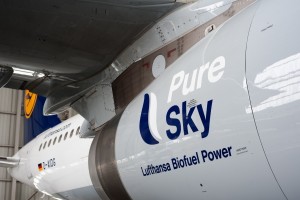
Lufthansa has become the first airline to run regular commercial flights using a mix of biofuel and kerosene in daily transfers between Hamburg and Frankfurt.
The six month trial will cover eight of its 28 daily flights of less than an hour between the two cities, which will according to Lufthansa reduce CO2 emissions by up to 1,500 tonnes during that period. As part of the burnFAIR project, a Lufthansa Airbus A321 (D-AIDG) will fly regularly between Hamburg and Frankfurt, using fuel that contains a 50-percent share of biosynthetic kerosene in one engine.
The main goal of this long-term test is to gain experience and generate measurement data over a longer period of time. This long-term test is pioneering work because so far airlines have tested biofuels only on individual test flights. During this test period the effects of biofuel on the environment and on maintenance and engine life expectancy also can be studied.
Before the actual trial period started, Lufthansa made intensive preparations for the practical tests. Aside from the actual research project, the acquisition of biofuel in sufficient volume and the complex logistics it involves was just a few of the challenges in the run-up to the trial.
The project will cost Lufthansa an estimated 6.6 million euros. “We know that biofuel is an issue we must address carefully. We can see the opportunities this fuel offers and give seri-ous attention to the debate on the requisite raw materials. But we first want to acquire expe-rience in daily practice in the use of biofuels. We are doing pioneering work in that no other airline to date has operated an aircraft engine with biofuel over a longer term,” observed Wolfgang Mayrhuber, Lufthansa Chairman and CEO of Lufthansa. “Our fuel is sustainable. No rain forest will be deforested for Lufthansa biofuel. In the procurement of biofuel, we ensure it originates from a sustainable supply and production process. Our licensed suppliers must provide proof of the sustainability of their processes.“
Lufthansa’s biosynthetic kerosene is derived from pure biomass and consists of jatropha, camelina and animal fats. Their supplier (the Finnish oil company Neste Oil) must provide proof of the sustainability of their processes and meet the criteria stipulated by the European Parliament and the Council in the Renewable Energy Directive.
“Our interest is to have sustainable resources in the future, to have an alternative to offer flights at affordable prices to everyone,” said Aage Dünhaupt, Lufthansa’s director of corporate communications for Europe.
The biofuel project planned by Lufthansa, was first announced at a joint press conference in April 2011 with Lufthansa Chairman and CEO Wolfgang Mayrhuber, with Peter Hinze, Parliamentary State Secretary and Government Aerospace Coordinator, and Professor Dr. Johann-Dietrich Wörner, Chairman of the Executive Board of the German Aerospace Center (DLR). The biofuel practical tests started 15 July 2011, after months of preparation.
